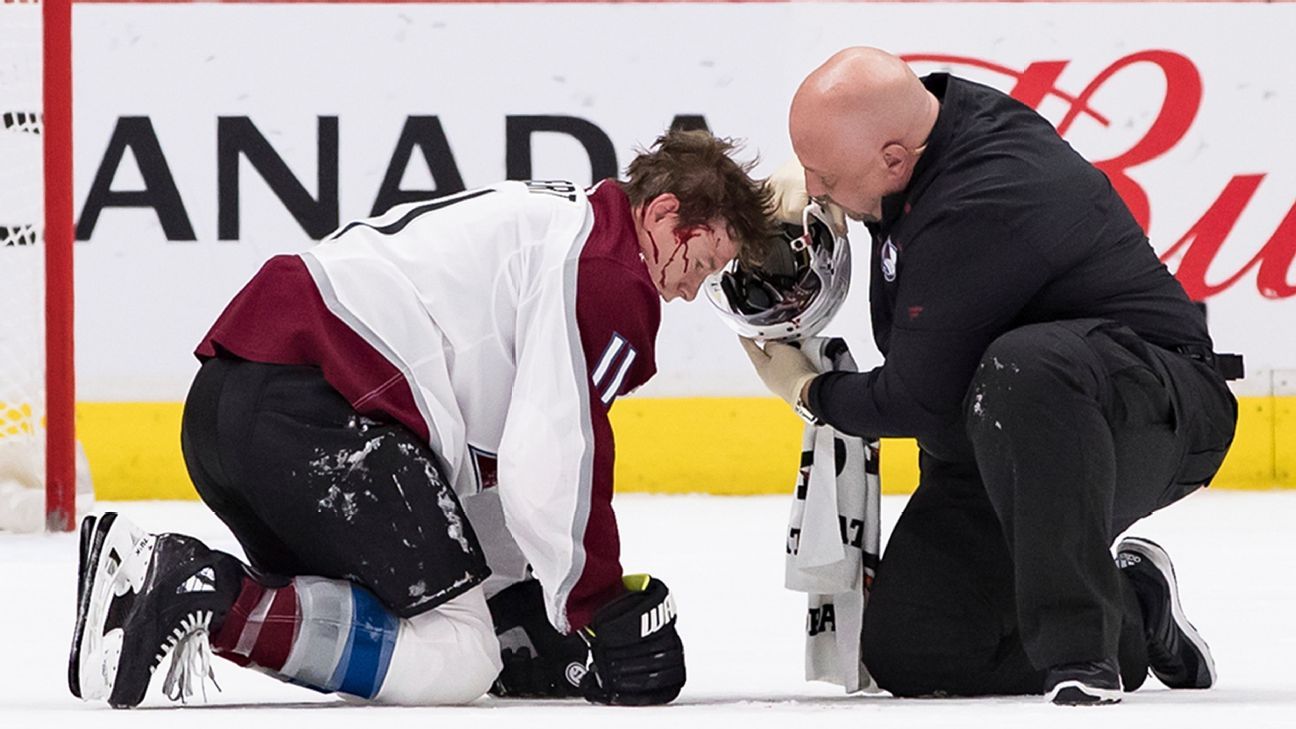
TORONTO -- While it acknowledges an error in judgment, the NHL will not amend its rulebook after an incident involving an injured Colorado Avalanche player Saturday night.
Against the Vancouver Canucks, forward Matt Calvert of the Avalanche lay bleeding on the ice after being struck by an Elias Pettersson shot in the third period. Play was allowed to continue because the Canucks had possession of the puck, and the on-ice officials felt Calvert's injury wasn't severe enough to stop play.
Alexander Edler scored to make it a one-goal game, and the Avalanche eventually won in overtime.
Colorado players were incensed after the game.
"A guy laying there, bleeding out the side of his head. I can only imagine if that was LeBron James and his head was bleeding, and the other team was allowed to take a 3-pointer to tie the game," Avs star Nathan MacKinnon said. "I know it's not the ref's fault. It's the league rule. I don't think he's faking it to try and get a whistle."
On Tuesday, NHL director of officiating Stephen Walkom said there was no push for a rule change at the league's meeting of general managers in Toronto.
"What we direct officials to do is, when there's a serious injury and any of them sees it, we want them to kill the play, especially when it's in the head or the face," Walkom said. "When a player is seriously injured on the ice, we don't want a lot of time going by before we kill the play. It seemed like an eternity in that game, even though it was probably closer to four or five seconds. The puck was moving around. The player attempted to get up. Of course we would have liked to blow the play down earlier, especially when it resulted in an injury."
Walkom said the Calvert injury occurred on a part of the ice where "no one had a real sight line" on it.
"By the time they were sure, the puck was in the net," Walkom said.
Walkom said that blood isn't always the determining factor for the severity of an injury, as it's sometimes difficult to see it.
"I don't think it's blood. I think it's more. ... If you see a player get a wicked stick to the head or a puck to the face, you can get a good sense from the players around him and how the player is acting on the ice," Walkom said. "We don't want players that are seriously hurt on the ice. We want to kill the play. That was just an unfortunate situation in that game."
Colin Campbell, NHL vice president of hockey operations, said he is concerned about players embellishing injuries that could whistle down a play more quickly, thus the reluctance to change the rulebook.
"We're always concerned with the competitive aspect of games. We're always worried about how competitively [teams] will take rules and use them. It's no different when a player embellishes an injury," Campbell said. "In that situation, we all agree there should have been a quick judgment there."
The general managers supported the NHL's stance and viewed the play as an unfortunate anomaly.
"The officials have the discretion to blow the play down. I can't recall many instances like that where there's been an incident," said Philadelphia Flyers GM Chuck Fletcher. "Usually they're making the right call at the time. I don't expect there to be any rule change to that effect."
In other news at the general managers' meeting:
• Campbell said Washington Capitals forward Garnet Hathaway will have a hearing Wednesday for spitting on Anaheim Ducks defenseman Erik Gudbranson in a game Monday night. "It's a fine or a suspension," Campbell said, regarding potential punishment. "I've never had this before. I've had player on official, but never player on player. But we'll hear the player's side of the story [at the hearing]."
• The general managers will continue discussing tweaks to the offside rule at their March meeting, including whether a player's skate in the air that "breaks the plane" of the blue line could be counted as that player being onside.
• Walkom said coaches' challenges are down about 65% since the NHL implemented a new rule that penalizes teams for a failed offside, goalie interference or missed stoppage of play challenges. "We think that's a great thing for the game," he said.
• Some GMs were upset that a coach who challenged something that didn't turn out to be challengeable under the rules could still get a penalty for it. Walkom said officials didn't want to "tell a coach that he couldn't challenge, because that would end up in the media the wrong way." But he said referees have been instructed to quickly correct coaches who may ask for, say, a challenge for a penalty. But Campbell said it's on the coaches to know the difference: "They've got a rulebook. They should know it."
• The NHL has named its general manager of the year award the Jim Gregory Manager of the Year Award, after the late Toronto Maple Leafs GM and scouting director who died on Oct. 30.
• Commissioner Gary Bettman and NHLPA executive director Don Fehr were seen meeting at the NHL offices after the GM meeting, but neither provided an update on collective bargaining talks. The NHL's CBA expires in 2022. Both sides opted not to reopen it early this year, ensuring short-term labor peace.















 Phone: (800) 737. 6040
Phone: (800) 737. 6040 Fax: (800) 825 5558
Fax: (800) 825 5558 Website:
Website:  Email:
Email: 






